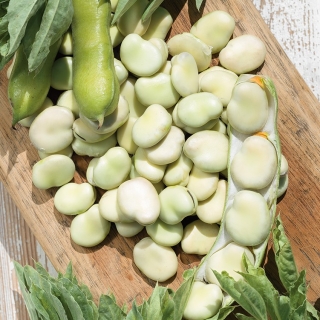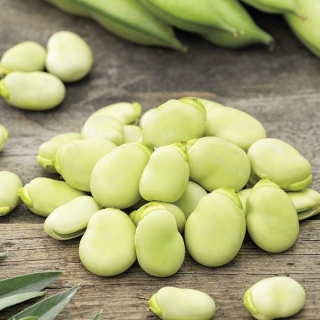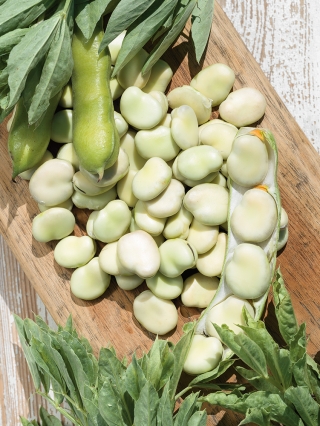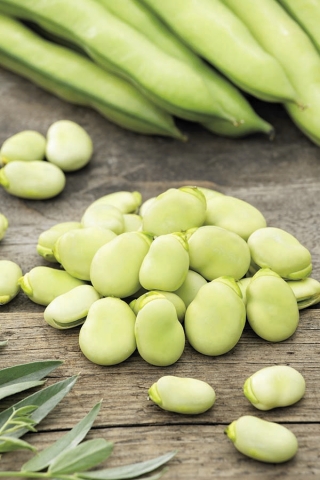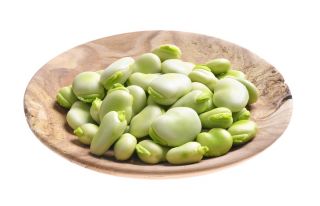Broad bean "Bolero" (Vicia faba) is an early variety that needs circa 90 - 100 days from the sow to reach crop maturity. It develop stiff stems that grow 120 cm tall. Its pods are very long and contain 4 - 6 round or broadly eliptic, large, creamy and delicious seeds. "Bolero" seeds are recommended for direct consumption, cooked, or freezing.
Broad bean belongs to the most valuable vegetables in terms of nutritional value. Fresh broad beans contain large amounts of calcium, phosphorus, magnesium and iron, as well as vitamin C and B vitamins. Thanks to the high content of iron and folic acid broad bean is recommended to people fighting anemia. Its seeds also contain a lot of proteins, what makes them a great alternative to meat and a precious source of protein in vegetarian diet.
Broad bean is grown from direct sow to the permanent site. Seeds are sown 2 - 3 per hole, 5 - 6 cm deep in 10 cm spacing and in rows 30 - 40 cm apart. You may sow broad bean "Bolero" seeds at the end of March and in the beginning of April. Broad bean cultivation site should be sunny or partially shady. Broad bean yields richest harvest in heavy, clay, humous soils with high water capacity. Broad bean is harvested at the milk-ripe stage, when the pods have grown and the seeds have developed and are pale green with a visible light stigma at the end. This occurs from June to August. When the stigma turns dark it means that the seeds are overripe and had lost their consumptional value.
Package contains 50 g of "Bolero" broad bean seeds, as well as the sow-by date and growing instructions.
- Weight: 50 g
- Height: 120 cm
- Use: direct consumption; freezing
- Harvest time: 90 - 100 days after the sow, June - August
- Site: sunny or partially shady; heavy, clay, humous soils with high water capacity
GardenSeedsMarket - has been in business for more than a decade and from the very beginning we have made the quality of our products the top priority. Throughout the years we have delivered the best quality goods to tens of thousands of customers from all over the world. Their satisfaction proves that we had chosen the right way.
All seeds we sell are subject to a multi-level quality control checks and only then are carefully packed and dispatched. Our products have been awarded numerous certificates and comply with the highest standards of the European Union. Our employees are experienced gardeners who are more than happy to answer your every question.
Where do our seeds come from?
All of the seeds sold in our shop come from the best producers from across the European Union. Thanks to a long-standing cooperation with them we were able to develop the most adequate storing and dispatch conditions, guaranteeing that you always receive fresh and carefully tested batches of seeds. Exclusion of the middlemen from the whole process not only makes it possible for us to avoid sending out-of-date seeds that might have been lying too long on a warehouse shelf, but also ensures the most attractive price for top quality products.
The quality control process
All our seeds must pass a four-stage quality control process.
Stage one begins with a careful selection of the suppliers. Than we proceed with controlling their crops, foreign producers are not excluded from the quality control process. Plants are checked at every stage of their development: when they start to grow, during blooming and when they start bearing fruit (seeds). At this stage the most important thing is to ensure proper spacing of the plants. Thanks to that obtaining the desired morphological characteristics of each particular species or variety, such as colour, height and shape, can be ensured.
Stage two consists of a detailed verification tests in laboratory conditions. With the use of the highest quality equipment by the highly qualified staff, our suppliers perform more than 30 000 quality checks annually. The seeds that do not meet our requirements are subject to technological refining processes, including drying, cleaning, upgrading and testing again.
Stage three starts with sowing seeds in selected control plots. That way we obtain valuable, exact information concerning their germination that must be maintained at an appropriate level. Simultaneously, the varietal identity of each species is checked at this stage.
Stage four takes place in our warehouses and consists of eliminating seeds that have been stored for too long on our shelves and replacing them with new batches. Each package is stamped with a unique batch number and also with the sow-by-date.
All four stages combined allow us to state with confidence that the seeds we deliver comply with the highest standards and have completed all required control stages with flying colours.
Prizes and awards
The seeds we sell are widely recognized for their quality and have won many awards. Our seeds won numerous gold medals and distinctions for their high quality. The World of Flowers was also honoured for its innovative approach.
Among those awards there were: TOP INNOVATION (June 2015), GOLD MEDAL AT THE POZNAN INTERNATIONAL FAIR (2015), CONSUMER QUALITY LEADER (2014), FARMER OF THE YEAR (2014).
In addition, we have also been awarded the “IDEAL BUSINESS” certificate for two years in a row.
Germination
We are committed to selling only the highest quality seeds. Taking into consideration the efforts we make daily, please also note that plants are living organisms and their germination and growth depends on many factors, such as temperature, soil type, humidity and the frequency with that they are watered, sowing time and conditions, use of fertilizers and plant protection agents (pesticides), as well as weather and climate conditions. We provide help by sharing the accurate and up-to-date sowing and growing information, however, we cannot bear any responsibility for the plants that were not cultivated in conditions appropriate for given species.

